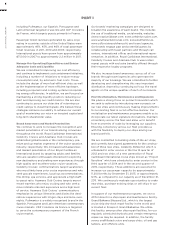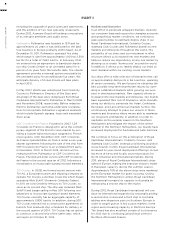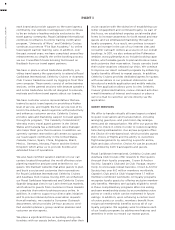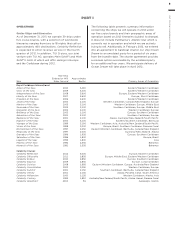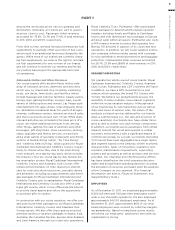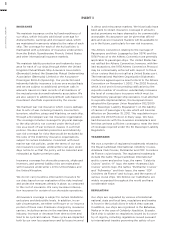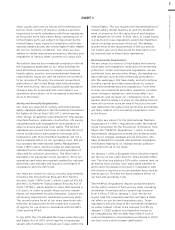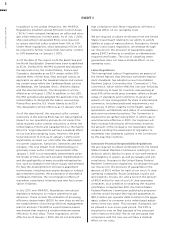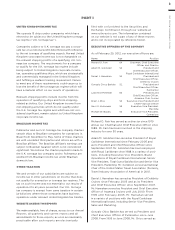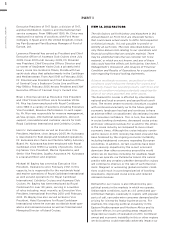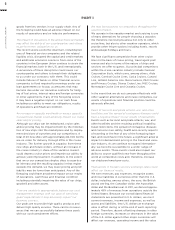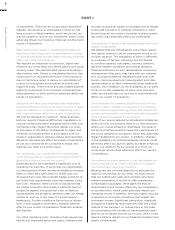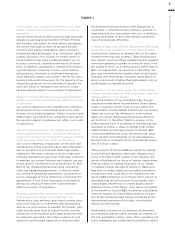Royal Caribbean Cruise Lines 2011 Annual Report Download - page 28
Download and view the complete annual report
Please find page 28 of the 2011 Royal Caribbean Cruise Lines annual report below. You can navigate through the pages in the report by either clicking on the pages listed below, or by using the keyword search tool below to find specific information within the annual report.
2011 ANNUAL REPORT 24
PART I
In addition to the global limitations, the MARPOL
Regulations establish special Emission Control Areas
(“ECAs”) with stringent limitations on sulfur and nitro-
gen oxide emissions in these areas. As of July 1, 2010,
ships operating in designated ECAs were required
to reduce their fuel sulfur content from 1.5% to 1.0%.
Under these regulations, ships operating in ECAs will
be required to further reduce their fuel sulfur content
to 0.1% beginning on January 1, 2015.
As of the date of this report, both the Baltic Sea and
the North Sea/English Channel have been established
as ECAs. During 2010, the IMO accepted and adopted
the application by the United States, France and
Canada to designate as an ECA waters within 200
nautical miles of their east, west and gulf coasts, as
applicable, as well as the Hawaiian Islands, but exclud-
ing certain areas within the Caribbean Basin such as
the Bahamas, the Canadian Arctic, Western Alaska
and the Aleutian Islands. This designation will be
effective as of August 1, 2012. In addition, in July 2011,
the IMO accepted and adopted the application by the
United States to designate the waters surrounding
Puerto Rico and the U.S. Virgin Islands as an ECA.
This designation will be effective as of January 2014.
As of the date hereof, the required sulfur content
reductions in the existing ECAs has not had a material
impact on our operations and we do not expect the
initial required sulfur content reductions in either the
United States, French and Canadian ECA or the Puerto
Rico/U.S. Virgin Islands ECA will have a material effect
on our fuel and operating costs. However, the addi-
tional reduction to 0.1% as of January 1, 2015 could
significantly increase our costs after this date based
on current capacities, fuel prices, itineraries and tech-
nologies. The cost impact from implementing pro-
gressively lower sulfur content requirements after
January 1, 2015 is not reasonably determinable given
the length of time until such possible implementation
and the applicability of many possible mitigating fac-
tors, such as changes in the future supply and demand
for fuel, the development of emissions abatement
technologies, including new engine designs or exhaust
gas treatment systems, the acceptance of alternative
compliance methods, the cost migration effects of
equivalent compliance initiatives and new fuel conser-
vation initiatives.
In July 2011, new MARPOL Regulations introduced
mandatory measures to reduce greenhouse gas
emissions. These include the utilization of an energy
efficiency design index (EEDI) for new ships as well as
the establishment of an energy-efficient management
plan for all ships. The EEDI is a performance-based
mechanism that requires a certain minimum energy
efficiency in new ships. These regulations will be
effective as of January 1, 2013. We do not anticipate
that compliance with these regulations will have a
material effect on our operating costs.
We are required to obtain certificates from the United
States Coast Guard relating to our ability to satisfy
liability in cases of water pollution. Pursuant to United
States Coast Guard regulations, we arrange through
our insurers for the provision of guarantees aggre-
gating $347.7 million as a condition to obtaining the
required certificates. The cost of obtaining these
guarantees does not have a material effect on our
operating costs.
Labor Regulations
The International Labour Organization, an agency of
the United Nations that develops worldwide employ-
ment standards, has adopted a new Consolidated
Maritime Labour Convention (the “Convention”). The
Convention, which will be effective one year following
ratification by at least 30 countries representing at
least 33% of the world gross tonnage, reflects a broad
range of standards and conditions to govern all
aspects of crew management for ships in international
commerce, including additional requirements not
previously in effect relating to the health, safety,
repatriation, entitlements and status of crewmembers
and crew recruitment practices. The Convention is
expected to be ratified during 2012, in which case it
would become effective in 2013. Our expenses will
likely increase following its effectiveness; however,
the amount of the increase is not reasonably deter-
minable pending the enactment of legislation to
implement new standards outlined in the Convention
by the enacting countries.
Consumer Financial Responsibility Regulations
We are required to obtain certificates from the United
States Federal Maritime Commission relating to our
ability to satisfy liability in cases of non-performance
of obligations to guests, as well as casualty and per-
sonal injury. Pursuant to the United States Federal
Maritime Commission regulations, we arrange through
our insurers for the provision of guarantees in the
amount of $15.0 million for each of our two U.S. ship-
operating companies, Royal Caribbean Cruises Ltd.
and Celebrity Cruises, Inc. and a bond in the amount
of $15.0 million for one of our U.K. ship-operating
companies, as a condition to obtaining the required
certificates. In September 2011, the United States
Federal Maritime Commission published a proposed
rule that would increase the required guarantees to
$30.0 million per operator ($90.0 million in the aggre-
gate), subject to consumer price index based adjust-
ments every two years. This increase, if adopted, will
be phased in over a two-year period. The FMC is
expected to vote on final passage of the proposed
rule in early to mid 2012. We do not anticipate that
compliance with the new rule will have a material
effect on our costs.


